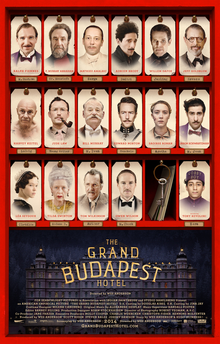
The Grand Budapest Hotel
The Grand Budapest Hotel is a 2014 comedy-drama film written, directed, and co-produced by Wes Anderson. Ralph Fiennes leads a seventeen-actor ensemble cast as Monsieur Gustave H., famed concierge of a twentieth-century mountainside resort in the fictional Eastern European country of Zubrowka. When Gustave is framed for the murder of a wealthy dowager (Tilda Swinton), he and his recently befriended protégé Zero (Tony Revolori) embark on a quest for fortune and a priceless Renaissance painting amidst the backdrop of an encroaching fascist regime. Anderson's American Empirical Pictures produced the film in association with Studio Babelsberg, Fox Searchlight Pictures, and Indian Paintbrush's Scott Rudin and Steven Rales. Fox Searchlight supervised the commercial distribution, and The Grand Budapest Hotel's funding was sourced through Indian Paintbrush and German government-funded tax rebates. Anderson and longtime collaborator Hugo Guinness conceived The Grand Budapest Hotel as a fragmented tale following a character inspired by a common friend. They initially struggled in their brainstorming, but the experience touring Europe and researching the literature of Austrian novelist Stefan Zweig shaped their vision for the film. The Grand Budapest Hotel draws visually from Europe-set mid-century Hollywood films and the United States Library of Congress's photochrom print collection of alpine resorts. Filming took place in eastern Germany from January to March 2013. French composer Alexandre Desplat composed the symphonic, Russian folk-inspired score, which expanded on his early work with Anderson. The film explores themes of fascism, nostalgia, friendship, and loyalty, and further studies analyze the function of color as an important storytelling device. The Grand Budapest Hotel premiered in competition at the 64th Berlin International Film Festival on February 6, 2014. The French theatrical release on February 26 preceded the film's global rollout, followed by releases in Germany, North America, and the United Kingdom on March 6–7. The Grand Budapest Hotel drew highly positive reviews for its craftsmanship and acting, though occasional criticism centered on the film's approach to subject matter, fragmented storytelling, and characterization. It earned $174 million in box office revenue worldwide, Anderson's highest-grossing feature to date. The film was nominated for nine awards at the 87th Academy Awards including Best Picture, winning four, and received numerous other accolades. Since its release, The Grand Budapest Hotel has been assessed as one of the greatest films of the 21st century.
It is an extremely common mistake, people think the writer's imagination is always at work, that he's constantly inventing an endless supply of incidents and episodes, that he simply dreams up his stories out of thin air. In point of fact, the opposite is true. Once the public knows you're a writer, they bring the characters and events to you and as long as you maintain your ability to look and to carefully listen, these stories will continue to... Stop it. Stop it! Don't! Don't do it!
The Grand Budapest Hotel
A number of years ago, while suffering from a mild case of "Scribe's Fever," a form of neurasthenia common among the intelligentsia of that time, I decided to spend the month of August in the spa town of Nebelsbad below the Alpine Sudetenwaltz, and had taken up rooms in the Grand Budapest, a picturesque, elaborate, and once widely celebrated establishment. I expect some of you will know it.
The Grand Budapest Hotel
YOUNG WRITER: It was off season and, by that time, decidedly out of fashion, and it had already begun its descent into shabbiness and eventual demolition. What few guests we were had quickly come to recognize one another by sight as the only living souls residing in the vast establishment, although I do not believe any acquaintance among our number had proceeded beyond the polite nods we exchanged as we passed in the Palm Court, in the Arabian baths, and on board the Colonnade Funicular. We were a very reserved group, it seemed, and, without exception, solitary.
The Grand Budapest Hotel
Perhaps as a result of this general silence, I had established a casual and bantering familiarity with the hotel's concierge, a West-continental known only as Monsieur Jean, who struck one as being, at once, both lazy and, really, quite accommodating. I expect he was not well paid. In any case, one evening, as I stood conferring elbow-to-elbow with Monsieur Jean, as had become my habit, I noticed a new presence in our company. A small, elderly man, smartly dressed, with an exceptionally lively, intelligent face and an immediately perceptible air of sadness. He was, like the rest of us, alone, but also, I must say, he was the first that struck one as being deeply and truly lonely. A symptom of my own medical condition as well. Who's this interesting old fellow? I inquired of Monsieur Jean. To my surprise, he was distinctly taken aback. Don't you know? He asked. Don't you recognize him? He did look familiar. That's Mr. Moustafa himself. He arrived earlier this morning.
The Grand Budapest Hotel
He often comes and stays a week or more, three times a year at least, but never in the season. Monsieur Jean signaled to me and I leaned closer. I'll tell you a secret. He takes only a single-bed sleeping room without a bath in the rear corner of the top floor and it's smaller than the service elevator! It was well known, Zero Moustafa had purchased and famously inhabited some of the most lavish castles and palazzos on the continent.
The Grand Budapest Hotel
However, this premature intermission in the story of the curious, old man had left me, as the expression goes, "gespannt wie ein Flitzebogen," that is, on the edge of my seat, where I remained throughout the next morning, until, in what I have found to be its mysterious and utterly reliable fashion, fate, once again, intervened on my behalf.
The Grand Budapest Hotel
